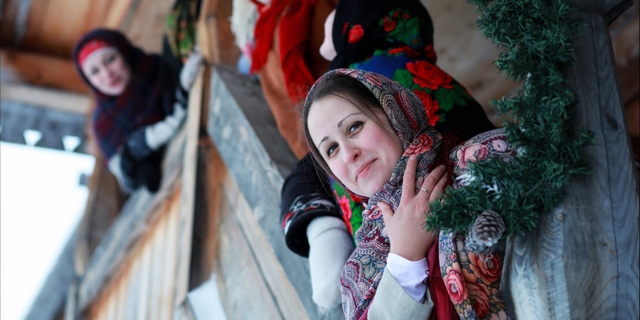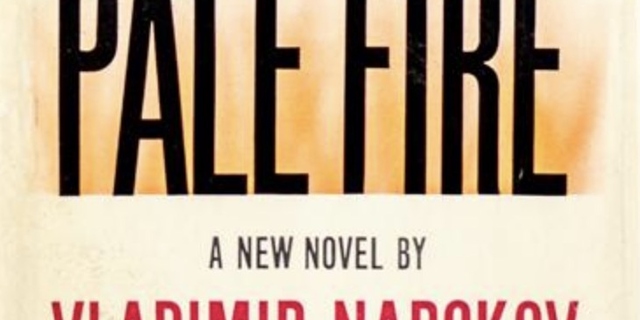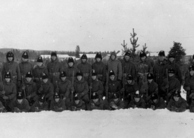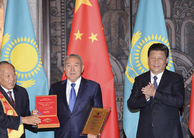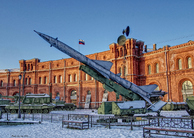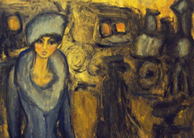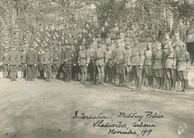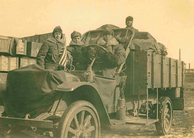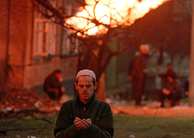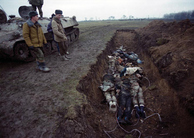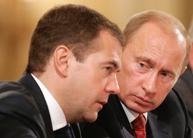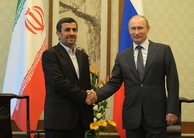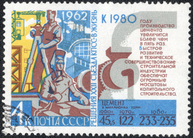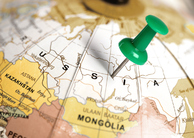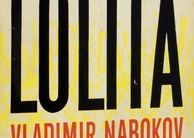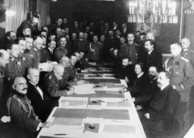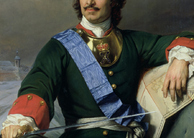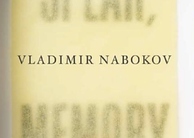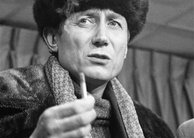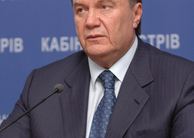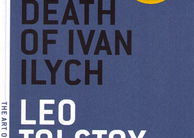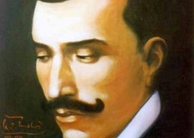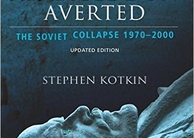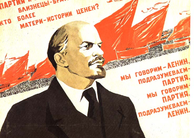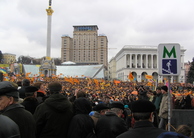|
Russia (tagged articles)
The keyword Russia is tagged in the following 36 articles.
2021, Vol. 13 No. 11
While the Cold War is popularly regarded as a war of ideological conflict, to consider it solely as such does the long-winded tension a great disservice. In actuality, the Cold War manifested itself in numerous areas of life, including the various... Read Article »
2021, Vol. 13 No. 04
While the history of ethnography in Russia dates back to the Kievan Rus era, modern ethnographic production in Russia developed in the 17th century and expanded during the late 18th and early 19th centuries as interest in folktales and in the lives... Read Article »
2020, Vol. 12 No. 11
This paper examines the peasantry's response to modernization measures taken by Imperial Russia and the Soviet Union during the late 19th and early 20th centuries. In the pursuit of modernity, the Tsarist Russian and early Soviet regimes altered... Read Article »
2019, Vol. 11 No. 01
Pale Fire by Vladimir Nabokov is a masterpiece of literature that seems to transform into a remarkably personal experience for anyone who approaches the text. The book reads in many ways like a game full of mysteries and innuendos and has in its... Read Article »
2018, Vol. 10 No. 10
After joining the European Union (EU) and the North Atlantic Treaty Organization (NATO) in 2004, Estonians felt secure and in charge of their future. However, following the 2007 Bronze Horseman incident in the Estonian capital of Tallinn which included... Read Article »
2016, Vol. 8 No. 10
In the annals of warfare, what often matters most is the simple question of who won. As a general rule of thumb, the winners are often the ones to have their perceptions and ideology recorded in our collective history, while the other side&rsquo... Read Article »
2016, Vol. 9 No. 1
The New Silk Road, formally termed the Silk Road Economic Belt and also known as the "One Belt, One Road," was first proposed by China's President Xi Jinping during his 2013 visit to Central Asia. This initiative aims to revive the historical vitality... Read Article »
2015, Vol. 8 No. 2
What I want to do today is answer one really big question. If we have time maybe we’ll get to the second question, but I want to answer one big question, because that’s what we should do as academics. It comes from an experience I... Read Article »
2014, Vol. 6 No. 10
Although the novel is mainly about unhappy families, Tolstoy makes the story of the one happy family, Ekaterina Scherbatsky (Kitty) and Konstantin Levin (Kostya), just as interesting as the others. Although every other relationship seems to tear... Read Article »
2014, Vol. 6 No. 04
In 1914 Russia was a powerful empire. It constituted a fundamental part of the European balance of power. However, years of bloody and costly war changed the nation by bringing to boil all the inequities and discontent built up under the Tsarist... Read Article »
2014, Vol. 6 No. 04
On August 15, 1918, American doughboys landed in Siberia to begin one of the more contentious episodes in U.S.-Soviet relations. The over seven thousand troops of the American Expeditionary Force were to remain for more than eighteen months, playing... Read Article »
2014, Vol. 7 No. 2
In the ultimate years of the Soviet Union, as the liberalizations introduced by perestroika and glasnost took full effect, the nationalistic convictions of historically discriminated territories within the Russian and Central Asian region began... Read Article »
2013, Vol. 5 No. 09
This article aims to investigate the effects of moderators such as culture, power dynamics and political factors on the negotiation behavior and processes displayed in a dyadic, geopolitical negotiation scenario by using a hybrid model of well-established... Read Article »
2012, Vol. 6 No. 1
In 1999, the Russian government all but razed Chechnya’s capital city of Groznyy. The Russian military devastated Chechnya, killing thousands of civilians and wiping out vital infrastructure, signifying the capstone in a campaign of destruction... Read Article »
2012, Vol. 4 No. 09
When on September 24th, 2011 Russian prime minister Vladimir Putin announced his bid to run for president in the presidential elections in March 2012, a supposition in Russia's political regime was confirmed that many observers suspected would... Read Article »
2012, Vol. 4 No. 04
Russia and Iran have a long history of being geographic neighbours, rivals, competitors and partners - a history which has coined mutual expectations, stereotypes and interactions. Still present in the Iranian collective memory, Tsarist Russia expanded... Read Article »
2011, Vol. 3 No. 12
Compared to other empires throughout history, the USSR was an exception. The rulers of the Soviet Union viewed empire and imperialism in ideological terms as ‘the highest and final stage of capitalism’.[1] By this Leninist definition... Read Article »
2011, Vol. 2011/2012 No. 1
The first decade of the twenty-first century was a period of change for Russia. The crisis of the 1990s was/were overcome and its international posture has improved. However, the scope and the stability of the shift are debatable and there is no... Read Article »
2011, Vol. 3 No. 06
This project examines the role of the Left Hegelian school of philosophy in Crime and Punishment by Fyodor Dostoevsky. Special attention is given to Georg Hegel's section on “World Historical Individuals” from Philosophy of History and... Read Article »
2011, Vol. 3 No. 05
In Vladimir Nabokov's Lolita, the overriding force of the narrator, Humbert Humbert, is his need to prove himself master of everything: other people, his own desires, fate, and language itself. Time and time again through Lolita we see Humbert&rsquo... Read Article »
2011, Vol. 4 No. 2
The problem of migration is one of the most urgent ones in the modern world. As a rule, people migrate voluntarily. In the USSR, however, migration against people's free will was quite a widespread phenomenon. Thus, many Russians found themselves... Read Article »
2011, Vol. 3 No. 03
The New York Times coverage of negotiations at Brest-Litovsk between January 1 and January 12, 1918, reflected the newspaper's preoccupation with Germany during wartime and her ulterior motives. It also evinced skepticism about the Bolsheviks' sincerity... Read Article »
2011, Vol. 3 No. 02
The Republic of Chechnya in Russia’s North Caucasus region has drawn significant attention for being host to remarkable instability, thriving terrorism, and a staggering display of human rights violations over the past two decades, including... Read Article »
2011, Vol. 3 No. 02
Andrei Rublev (c. 1360-1430) is a mysterious figure, whose biography is not well known, although he is historically considered the best-known painter of Russian icons and frescoes. Early in his life he joined the Trinity-Sergei Lavra Monastery,... Read Article »
2011, Vol. 3 No. 01
Peter the Great inherited a score of problems in the administration of his empire. Of course, through his well-known zest and ambition, he tried to solve most of them, and made steps in that direction. However, his actions did not always have the... Read Article »
2011, Vol. 3 No. 01
The insight that Vladimir Nabokov provides into the 1905 Russian Revolution, in his book Speak, Memory, sometimes merges with the general view--presented, for example, by Nicholas V. Riasanovsky in a more traditional account--but at many other times... Read Article »
2011, Vol. 3 No. 01
Yevgheny Yevtushenko’s poetry spans time and space when relating to Russia and its history. His poetry, as he himself, declares, is intended to teach the conscience of anyone who reads it. And indeed, his poetry, whether political or romantic... Read Article »
2010, Vol. 4 No. 1
The initial 100 days of Viktor Yanukovych’s presidency appeared to be a complete departure from the Yushchenko presidency. While publicly reiterating his commitment to integration with the European Union and supporting transparency, freedom... Read Article »
2010, Vol. 2 No. 03
In Leo Tolstoy's The Death of Ivan Illyich, the story's protagonist--Ivan--is dead before the story begins. The first chapter concerns itself with some of Ivan’s work associates. With the exception of a posthumous cameo, Tolstoy completely... Read Article »
2010, Vol. 2 No. 02
The Chechen people have endured a long history of aggression, culminating at the end of the twentieth century during which a separatist struggle against Russia began, triggering the First Chechen War in 1994. At the onset of the Second Chechen War... Read Article »
2010, Vol. 2 No. 02
If Bulgakov is a well know name, the same cannot be said for Matos, who was a literary man considered one of the Croatian masters of Modernism, and a key persona in the country’s culture. He was not only a writer, but also a poet, a journalist... Read Article »
2010, Vol. 2 No. 01
As the world's first real Marxist experiment, the Soviet Union, by virtue of lasting seventy odd years, proved Western intelligentsia wrong. The latter had long thought it was doomed to fail. When the Berlin Wall fell in 1989 and the Soviet Union... Read Article »
2009, Vol. 1 No. 11
By the time 1921 came around, Russia’s economy had been maimed by the effects of War Communism. Socialism had not begun on a good note, and Vladimir Lenin was becoming concerned with the unfortunate state of the economy. His response to the... Read Article »
2009, Vol. 3 No. 1
Over the two decades of post-Soviet history of modern Russia, its foreign policy has gone through several distinct periods and long-term trends. The periodization of the new Russia’s foreign policy includes a “romantic” or &ldquo... Read Article »
2009, Vol. 2 No. 2
The responsibility of Georgian President Michael Saakashvili for the war with Russia continued to be hotly debated in Georgia, Russia and the world several months after its end.1 Indeed, there are various views about Saakashvili's decision to attack... Read Article »
2008, Vol. 1 No. 2
Following the collapse of the Soviet Union, the newly-formed Russian Federation faced a considerable economic downturn. During the post-Soviet economic collapse spanning from 1991 to 1998, Russian gross domestic product (GDP) fell from $509,381,... Read Article »
Expedited Article Review
Submit an article and get a decision fast.
If you need a fast decision, INQUIRIES Journal offers expedited processing of your submission for a small fee. Depending on the expedited review option you choose, you can receive a decision in as few as 5-days.
In addition to a shorter review period, the fee supports the journal's continued operation and open-access publishing model. Standard submissions are always free. Submit Now » - Submit an Article to Inquiries Journal -
|


